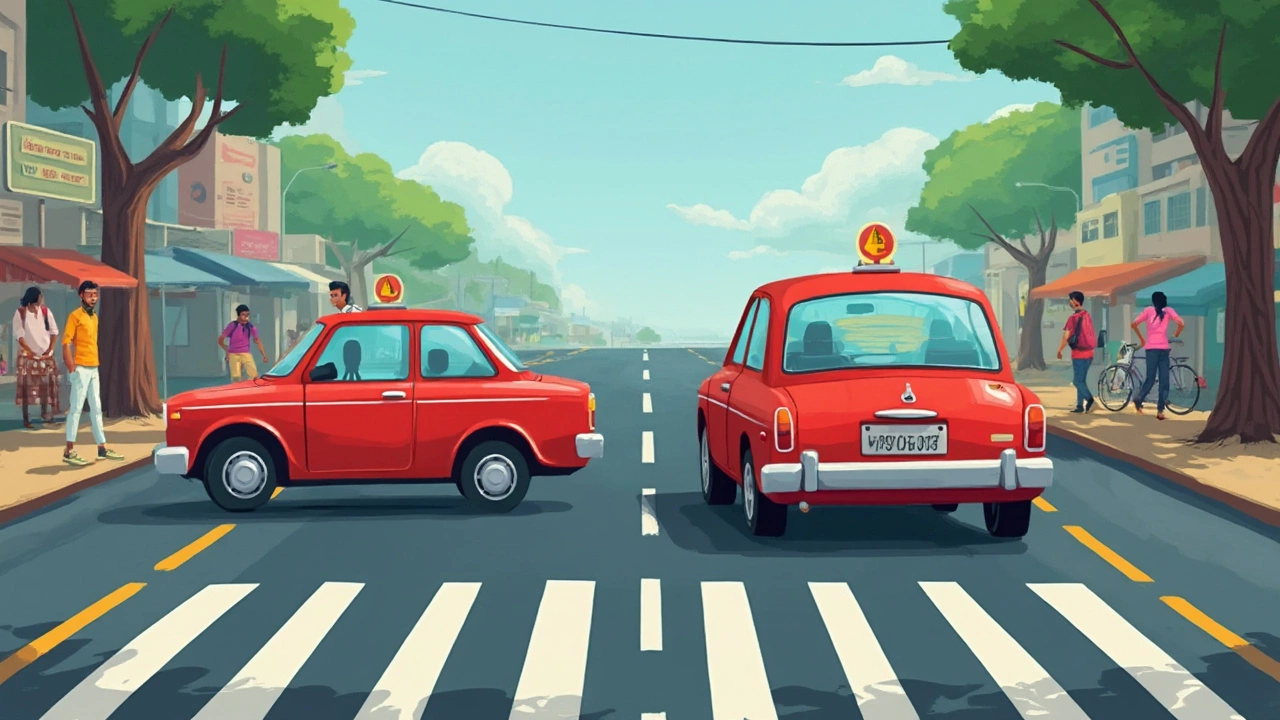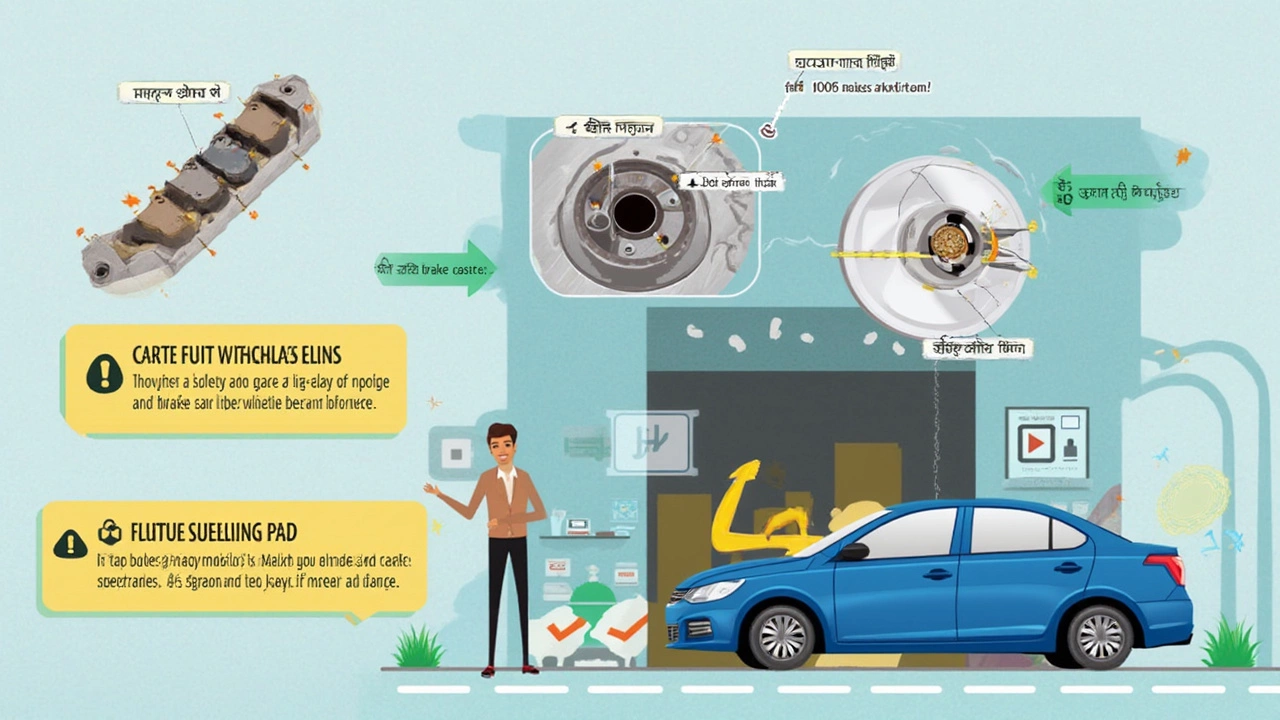 May, 7 2025
May, 7 2025
Ever wonder if your brakes are giving you clear warning signs, or if you're just being paranoid? You're not alone. Brake pads don't just have a set calendar date for retirement—they wear out at different speeds, depending on your driving habits, car type, and where you drive most.
If you slam on the brakes a lot, live in a hilly neighborhood, or spend hours in stop-and-go traffic, don't be surprised if your brake pads wear down faster than a friend's who mostly cruises on highways. Ignoring those squeaks, vibrations, or that soft pedal feeling isn’t just risky—it could end up costing you way more in repairs.
Think of your brakes as your car’s most important safety net. If you last checked your pads during the pandemic, or if you can’t remember at all, you’re probably overdue. Don’t wait for the grinding noise to spell it out for you. Catching brake problems early means stopping safely when it matters most.
- What Impacts Brake Pad Lifespan?
- Common Signs You Need New Brakes
- Average Replacement Intervals
- Tips for Longer-Lasting Brake Pads
- When in Doubt, Get Them Checked
What Impacts Brake Pad Lifespan?
Let’s get straight to it: how long your brake pads last depends on a bunch of real-world stuff, not some magic number. There’s a reason your cousin’s pads lasted twice as long as yours, even if you both drive the same car.
First off, driving habits. If you brake hard at every light or love weaving through rush hour with quick stops, your pads take a beating. Smooth, gradual braking usually means longer life for car brakes. City drivers who deal with a lot of stop-and-go see more wear than folks cruising steady on highways.
Your local roads matter too. Hills and mountains force you to use your brakes way more than flat, open terrain. Heat from constant braking up and down slopes wears pads faster. Even your climate counts; places with a lot of rain, snow, or road salt can cause extra rust and pad breakdown.
The kind of brake pads in your car is another big factor. There are three main types:
- Organic: Quiet and gentle on rotors, but they wear out quickest—good for city commutes or folks who don’t tow heavy loads.
- Semi-metallic: Tougher and last longer than organic, with decent performance for most drivers.
- Ceramic: Last the longest and make less dust. A popular pick for newer cars, but they usually cost more.
The car itself has a say, too. Heavier vehicles like SUVs or trucks chew through brake pads quicker. Towing, carrying lots of people, or loading up the trunk piles on extra stress. Even your wheels matter—some big, sporty rims expose brakes to more grime and water, which can speed up the wear.
One more thing: don’t forget regular brake maintenance impacts lifespan big time. If your brakes are squealing or vibrating, or your mechanic says the rotors need attention, ignoring that keeps the pads from doing their job for as long as they should.
| Driving Condition | Brake Pad Life Expectancy |
|---|---|
| City/Stop-and-Go | 20,000-30,000 miles |
| Highway/Mainly Cruising | 35,000-70,000 miles |
| Mountainous/Towing | 15,000-25,000 miles |
Bottom line? You can’t just follow your friend’s schedule. Check your brake wear based on how and where you drive, and keep up with regular checks to make those pads last as long as possible.
Common Signs You Need New Brakes
Not sure if your brake pads are toast? Pay attention to what your car is telling you. Most of the time, there are warning signs before you get into a truly bad spot.
- Squeaking or squealing sounds: Ever hear that annoying screech when you slow down? That’s often the built-in wear indicator rubbing against the rotor. It’s a pretty clear hint your car brakes want attention.
- Grinding noise: If you’ve ignored the squeak and you’re now getting a deep grinding sound, it probably means your pads are completely worn down. Now you’re ruining your rotors, and repairs just got way pricier.
- Longer stopping distance: When your car takes longer to stop, or you have to push the pedal farther down to get a response, don’t shrug it off. That’s a sign you need to replace brakes right away.
- Vibrations in the brake pedal: If the pedal shakes when you press it, your brake pads might be wearing unevenly. Sometimes it means warped rotors, too. Either way, get it checked out quickly.
- Dashboard indicator light: Some newer cars have a brake warning light that pops up when pad wear is detected by a sensor. Don’t ignore the light—it’s not just being dramatic.
If you’re asking, “So, what’s normal?” Here’s a quick overview of how long typical brake pads are supposed to last, and the signs to watch for.
| Sign | What It Means | What To Do |
|---|---|---|
| Squeal/Squeak | Wear indicator is engaged, pads close to the end. | Schedule a brake check soon. |
| Grinding | Pad is gone, metal-on-metal contact. | Replace pads and likely rotors immediately. |
| Longer Stops | Brake pads and possibly rotors are worn. | Get the brakes inspected and replaced if needed. |
| Shaking Pedal | Possible uneven pad wear or warped rotors. | Professional check-up recommended. |
| Warning Light | Electronic sensor triggered by thin pads. | Inspect and replace brake pads soon. |
If you catch these signals early, you’ll avoid bigger repair bills and lower your risk of a brake-related accident. It’s not about guessing—it’s about listening to what your car is already telling you.

Average Replacement Intervals
When it comes to swapping out brake pads, there’s no hard-and-fast rule that fits every car and driver. Still, most auto experts say you can expect to replace car brakes somewhere between 25,000 and 70,000 miles. That’s a pretty wide range, and it depends on a bunch of stuff—like how you drive, the type of brake pad material, and the make and model of your car.
If you drive mostly in the city with a lot of stopping and starting, you’ll probably need new pads closer to the lower end—sometimes even under 30,000 miles. On the other hand, highway commuters and folks in flatter areas might get way more life from their brake pads. Here’s a quick look at some typical replacement intervals for different types of pads:
| Pad Type | Average Miles |
|---|---|
| Organic (Non-metallic) | 20,000 – 40,000 |
| Semi-metallic | 30,000 – 60,000 |
| Ceramic | 40,000 – 70,000 |
Don’t ignore what your car manual says, either. Manufacturers usually give a ballpark estimate for brake maintenance in the maintenance schedule. It’s smart to peek at your pads every time you rotate your tires or get your oil changed. A lot of mechanics actually check them for free during regular service.
If you don’t drive a lot—for example, less than 5,000 miles a year—don’t assume your pads will last forever. Brake materials age even if they’re not getting worn down, so most folks should plan on a professional check every year or two.
Tips for Longer-Lasting Brake Pads
Most folks don’t want to be replacing brake pads every year. Good news—simple habits can keep yours going strong. First, try to coast before you brake instead of slamming down last second. Hard stops chew up your car brakes way quicker, especially in heavy city traffic.
If you drive an automatic, use that “downshift” or low gear when you’re heading downhill. It takes the load off your brake pads, so they aren’t battling gravity nonstop. And if your car’s always packed with cargo or you’re towing, lighten that load whenever you can. Extra weight makes the brakes work harder and wear out faster.
Stick to your maintenance schedule, too. Have your mechanic check your brakes whenever you’re in for a service—waiting for the warning light isn’t the best plan. Swapping out brake fluid every couple of years helps your whole brake maintenance routine, keeping everything in top shape inside and out.
- Ease into stops when possible—coast first, then brake.
- Downshift on long hills instead of riding the brakes.
- Cut down on extra weight in your vehicle when you can.
- Get regular brake checks during oil changes or big services.
- Replace brake fluid per your car’s manual (usually every 2-3 years).
One cool fact: A study by a major brake manufacturer found that drivers who mostly coast and avoid harsh stops can add up to 10,000 extra miles to their brake wear interval compared to folks who constantly hit the brakes hard. Small habit tweaks really can mean fewer trips to the shop and more cash in your pocket.
| Driving Habit | Estimated Brake Pad Life |
|---|---|
| Highway driving | 60,000 miles |
| City driving (heavy braking) | 25,000 miles |
| Coasting & gentle stops | Up to 70,000 miles |
Keeps things smooth, be easy on the brakes, and your wallet will thank you.

When in Doubt, Get Them Checked
If you’re ever on the fence about your brake pads, just get them checked. You don’t need to be a mechanic to notice when something feels off, but a pro can spot what you miss. Most shops will do a brake inspection for free or for a small fee, so there’s no excuse to ignore possible problems. The cost of a checkup is nothing compared to a failed brake system.
Some signs might sneak up on you, though. Maybe your car pulls to the side when braking, or the pedal feels spongy. Sometimes new noises, like grinding or high-pitched squeals, only show up in certain conditions. Don’t wait for these little hints to become flat-out problems.
Here’s what a basic brake check usually covers:
- The mechanic measures the thickness of your brake pads and looks for uneven wear.
- They’ll check the rotors and calipers for grooves, rust, or warping.
- They’ll inspect brake fluid level and quality—discolored fluid or low levels can point to bigger issues.
- They test the whole braking system by road-testing your car for any odd sounds or performance shifts.
Worried about waiting too long? Here’s what could happen if you ignore brake maintenance:
| Issue | What Can Happen |
|---|---|
| Worn pads | Damages rotors, costs more to fix |
| Low fluid | Brake failure risk rises fast |
| Warped rotors | Vibration, longer stop times |
If you’re not confident about doing a check yourself, most local shops and national chains offer brake checks anytime. Schedule one if your car’s acting weird, before a long trip, or at least once a year if you drive regularly. Don’t gamble with your car brakes—one check can save you money and even your life.